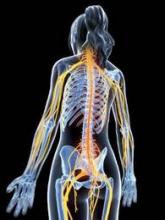Physical disabilities in patients with progressive multiple sclerosis may be correlated with lowered gamma-aminobutyric acid (GABA) concentrations, according to Dr. Niamh Cawley of Queen Square Multiple Sclerosis Centre, University College London Institute of Neurology.
In the patient group of 30 individuals with secondary progressive MS, GABA concentrations were 0.403 mmol lower in the hippocampus than in the control group, and were 0.385 mmol lower in the sensorimotor cortex. There was no significant difference in prefrontal cortex GABA levels between the patient group and the control group (Brain. 2015 Sep;138[pt 9]:2584-95. doi: 10.1093/brain/awv209).
A decreased GABA concentration in the sensorimotor cortex was associated with diminished motor function in right upper and lower limbs, and the patient group scored worse than did the control group on all motor and sensory tests performed. Grip strength dropped by nearly 11 (kg force) for each GABA-unit decrease, and muscle strength in the right upper and lower limbs decreased by nearly 9.
“These findings raise the possibility that altered GABA neurotransmission may be a marker of neurodegeneration, but it may also suggest that GABA is a mechanism of neurodegeneration in progressive multiple sclerosis patients. If we put these findings together with the evidence that GABA may mediate neuroprotection, targeting GABA may be a productive strategy that should be further explored in multiple sclerosis,” wrote Dr. Cawley and her associates.
The work was funded by the Multiple Sclerosis Society of Great Britain and Northern Ireland, Philips Healthcare, and the U.K. National Institute for Health Research.
Read the full study in Brain.


